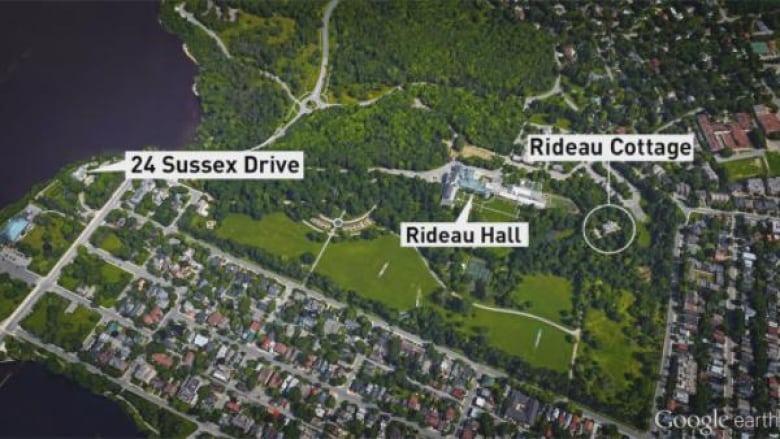What we know so far about the Rideau Hall intruder
Manitoba's Corey Hurren is a Canadian Ranger, small business owner

Details are beginning to emerge about the armed man from rural Manitoba who gained entry to the grounds of Rideau Hall Thursday morning.
On Thursday, several police vehicles swarmed Rideau Hall, the Governor General's residence and the prime minister's temporary home, after RCMP said Corey Hurren, 46, breached the Thomas Gate at around 6:30 a.m.
CBC has confirmed Hurren is a member of the Canadian Rangers, a component of the Canadian Army Reserve that serves in the remote and coastal regions, typically offering help with national security and public safety operations.
He's now facing several charges and is set to appear in court Friday.
Intruder made it to greenhouse
Hurren was not known to police or in their databanks, said RCMP Deputy Commissioner Mike Duheme in a press conference Friday morning.
He was, however, heavily armed with "several weapons," Duheme said.
He didn't specify the types of weapons other than to say a member of the Corps of Commissionaires, which patrols the grounds, saw him walking with what appeared to be a rifle.
The intruder's vehicle came to a stop along a walking path about 120 metres from the gate where it burst through, said Duheme.
He then hid by the Rose Garden on the grounds for about three minutes before heading toward the greenhouse on foot, said Duheme.
National Capital Commission workers first saw the vehicle and notified the Corps of Commissionaires who were on the grounds. They then saw the intruder walking up the path and contacted the Rideau Hall Operation Command Centre, who contacted RCMP, said Duheme.
Minutes later, Hurren made it to a greenhouse on the grounds that has limited public access. That's where RCMP members saw him and began speaking to him at 6:45 a.m., but Duheme said the suspect didn't respond until several minutes later. The discussion then continued for more than an hour and a half before he was arrested without incident just before 8:30 a.m.
Prime Minister Justin Trudeau and his family live at Rideau Cottage close to the greenhouse; however, they and Governor General Julie Payette were away at the time.
"I want to stress that there was never any danger to the prime minister and his family nor to the Governor General, as neither was on the ground at the time of the incident," said Duheme.
As a precaution, the RCMP's chemical, biological, radioactive, nuclear and explosive team searched and secured Hurren's truck, he said.
The RCMP said it is collaborating closely with the Canadian Armed Forces in the investigation and charges are pending.

According to his LinkedIn page, Hurren lives in Bowsman, Man., about 390 kilometres northwest of Winnipeg near the Saskatchewan border, and is the owner of the small business, GrindHouse Fine Foods, which makes sausages.
According to a Bowsman Lions Club Facebook post, Hurren served with the Royal Canadian Artillery in the late 1990s out of Yorkton, Sask. A member told CBC News Manitoba that Hurren belonged to the club.
CBC News Manitoba also reported that roughly an hour before Hurren entered the Rideau Hall grounds, a Facebook page associated with his Grindhouse Fine Foods business posted a meme of a big outdoor party that would supposedly occur after the lockdown.
The post also directs people to look up "Event 201," a worldwide pandemic preparedness exercise run last year that conspiracy theorists now use to suggest Microsoft co-founder Bill Gates is behind COVID-19.
Other posts from Hurren's business poke fun at the hardships and fears spawned by the pandemic. Some mention the work of the Rangers and the Canadian military.
RCMP would not give details of where Hurren had been in the time leading up to Thursday's intrusion and didn't know if he had been in the nation's capital for another reason.
But they do believe he acted alone.
Rangers serve as helpers in communities
Whitney Lackenbauer, a Canada Research Chair and professor at Trent University and author of The Canadian Rangers, A Living History, says he was startled to learn a member of the Canadian Rangers was arrested.
Lackenbauer, who holds an honorific title at the organization, said Canadian Rangers come from all walks of life, from civil servants to lumberjacks to electrical engineers, but tend to be respected members of their communities with deep knowledge of the geographies where they serve.
"I definitely am surprised because all the rangers who I've had the pleasure of meeting over the last 20 years have not struck me as the type of people who would take this kind of action."
A key function of Rangers is supporting isolated coastal and northern communities by helping in search and rescue operations, serving as guides for visiting members of the military, and, on occasion, providing intelligence to the military about any unusual vessels or aircraft they see in remote areas.
Canadian Rangers are issued a C19, which is a firearm patterned after a hunting rifle, along with rounds of ammunition each year. The rifle is used mainly to help protect communities from bears and for hunting if food is scarce.
They are not provided basic training, like other members of the military, and are not expected to serve overseas, said Lackenbauer.
with files from CBC's Kimberley Molina, Trevor Pritchard, Elizabeth Thompson and Ian Froese


